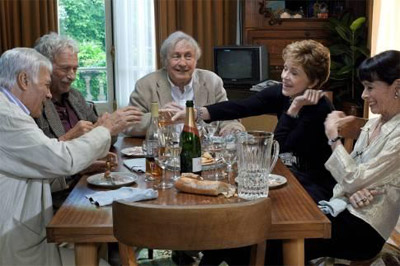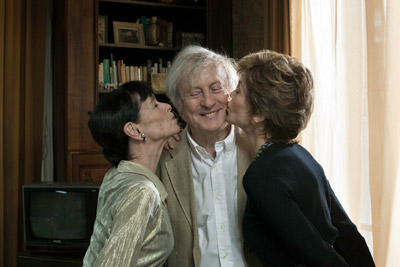Stéphane Robelin And If We All Lived Together? Interview

Stéphane Robelin And If We All Lived Together? Interview
Cast: Jane Fonda, Daniel Brühl, Géraldine Chapman, Guy BedosDirector: Stéphane Robelin
Genre: Comedy
Running Time: 96 minutes
Synopsis: Annie (Géraldine Chaplin), Jean (Guy Bedos), Claude (Claude Rich), Albert (Pierre Richard) and Jeanne (Jane Fonda) have been friends for more than 40 years.
So when memories let them down, heart rates quicken and their families plot their future in retirement homes they decide to rebel and live all together. Their new communal lifestyle provides plenty of surprises, challenges and adventure but soon stirs up memories and hidden secrets from the past.
Release Date: July 26th, 2012
Interview with Stéphane Robelin
Stéphane Robelin started filmmaking in the 1990s, writing and directing short films. Later he began working in the field of TV documentaries mainly for the national French TV station, France 2. His feature debut Real Movie (2004) premiered at the Dashanzi Underground French Film Festival in Peking. And If We All Lived Together? is his second feature film.Question: How did you get the idea for the unconventional plot of your film?
Stéphane Robelin: I always dreamed of bringing legendary actors together in an ensemble film dealing with family and friendship. I was particularly interested in the social issue of dependency and the elderly, which is rarely explored in cinema. When I started writing the screenplay, I remembered my great-grandparents declining in health when I was a teenager. At that time, my grandparents didn't quite know how to take care of them, because they hadn't been prepared for this situation. So I was inspired to write a story about a group of aging friends who decide to live together.
Question: How did you develop your project and how did you find your characters?
Stéphane Robelin: I like to write with some actors in mind but the original cast changed during the years of development due to their availability. Only Claude Rich was there from the early beginning and the other actors joined us throughout the different stages of scriptwriting. We had to wait for four years before shooting the film in 2010. Initially, our financial partners were put off by the idea of a film about old people, and also by my young age, but once we had won their trust they grew to love the project. The Region Ile de France and Canal were the first on board. The contribution made by our German co-producer Peter Rommel, who joined the project early as well, proved to be crucial in the end as he raised one third of the budget.
Question: How did you convince your actors, especially Jane Fonda, to join the cast?
Stéphane Robelin: For me Jane Fonda is a legendary actress - think of Klute or Coming Home - known for her political activism and her very strong personality. She hadn't acted in France for almost 40 years - not since Godard's Tout Va Bien - but she speaks fluent French and so we tried our luck. She liked the screenplay and the idea of shooting with Geraldine Chaplin and high-profile French actors. It was my producer Christophe Bruncher who seduced her with his beautiful letters and clinched the deal. Jane joined the cast at a later stage of the project after Claude Rich, Geraldine Chaplin, Guy Bedos and Pierre Richard.
I was very impressed to have Pierre Richard on board. His comedies were an important part of my childhood, so it was a great honour to work with him. He liked the idea of acting in a more reserved way, focusing on emotions rather than on gags.
Question: How did you bring the actors together to form a community?
Stéphane Robelin: The legendary actress Jane Fonda, the humourist Guy Bedos, the great Claude Rich, the comic actor of my childhood Pierre Richard and the very "chaplinesque" Geraldine Chaplin: they are all very different and bringing them together was a challenge because they had never met before. The first meeting in Paris before the shoot went very well, they got along because they have compatible characters and they are very unselfish.
As a young director, I was delighted to see the respect the other actors had for one another and for Jane Fonda in particular, which gave them confidence and helped to create the dynamics of the group.
 Question: How did you achieve the style and the particular charm of your film?
Question: How did you achieve the style and the particular charm of your film? Stéphane Robelin: I decided to focus mainly on the actors and I gave a free hand to the director of photography. Together with the set designer, I wanted to create an atmosphere from another period, that of the characters. The set and the lighting of the film have a particular quality, an old-fashioned charm, but it's not gloomy or nostalgic. More like an old holiday home where you find thousands of objects and souvenirs�
Question: The character played by Claude Rich is intent on seducing and does not want to give up his sexuality. Was this aspect of the experience of getting old something you particularly wanted to show?
Stéphane Robelin: Robelin: We are all sexual beings and guided by desire throughout our entire lives. Claude (Claude Rich) embodies the sexual quest of the elderly, but the relationship between Jane Fonda's and Daniel Brühl's characters also has a physical ambiguity.
That's also why I wished to have at least one love sequence: we see the couple played by Geraldine Chaplin and Guy Bedos reconciling after a fight by making love.
Question: What was your approach to humour in the film?
Stéphane Robelin: Life in a community like this is tragic and comic at the same time, and all the humour in the film stems from the difficulties of living together and growing old. There is always a little catastrophe waiting and in the end the community of old friends was naturally funny. I don't like the heavy-handed humour you see in certain films; I prefer humour to have a subtle mysterious quality.
Question: Do you think living with friends is a good solution to the problem of getting old? Are the characters following an ideal or were they driven by necessity?
Stéphane Robelin: Living in a community can be a beautiful adventure and many people who are the same age as my characters have some experience of communes and the communitarian ideals of the 1970s. People in that generation dreamed of spending their old age living with their friends, but only a few actually put that into practice. I would like to try to do it myself, but it doesn't mean that I don't expect there to be any difficulties. Still, it's definitely more fun than ending your days in a retirement home.
Question: What does your film say about family life?
Stéphane Robelin: Our society will have to cope with an "invasion" of old people over the next few decades and we will have to find a solution. How are we going to spend the rest of our lives when our children won't help us? It's time to address these questions instead of avoiding them. In the past, aging parents were automatically taken care of by their children. But since the era of 1968, old people don't live with their families anymore.
Question: How did you become a director?
Stéphane Robelin: As a boy, I loved the films of Bertrand Blier for their innovative spirit and free narrative. I dreamed of exploring the freedom enjoyed by Blier and experimenting with surreal situations, and I wanted to tell my own stories in an original way. When I started film studies in Nice, I developed a taste for the Italian comedies of the 1960s and 1970s by directors like Ettore Scola, Dino Risi, Marco Ferreri and later Nanni Moretti.
These days, I'm very fond of Pedro Almodovar: in fact, I like a variety of forms and don't stick to a certain genre. I enjoy constructed American thrillers as much as I love innovative slow-paced art house films that are full of mystery. I'm a very open-minded filmgoer.
Question: Do you think popular films can invite the public to reflect on certain things?
Stéphane Robelin: I want to do original work that is also popular. I see my films as an exchange with the audience. I sense that rather than being afraid of this story about old people, the public is very much intrigued by their friendships and their desires. And they are also able to explore these issues while enjoying the comic side of the film. Combining both these aspects has opened up the film to a larger audience. In France, people always want to separate commercial cinema from art house films, but I personally don't want to fall into either of these categories.
Question: If you lived in a community, would you like it to be a libertarian or a collective one?
Stéphane Robelin: I prefer libertarian communities! I think groups work better if everybody takes responsibility for themselves. And they shouldn't be too strict. If everyone has to follow a draconian set of rules, life isn't going to be much fun. What do you think?
MORE
- Mission: Impossible Fallout
- Glenn Close The Wife
- Allison Chhorn Stanley's Mouth Interview
- Benicio Del Toro Sicario: Day of the Soldado
- Dame Judi Dench Tea With The Dames
- Sandra Bullock Ocean's 8
- Chris Pratt Jurassic World: Fallen Kingdom
- Claudia Sangiorgi Dalimore and Michelle Grace...
- Rachel McAdams Disobedience Interview
- Sebastián Lelio and Alessandro Nivola...
- Perri Cummings Trench Interview



